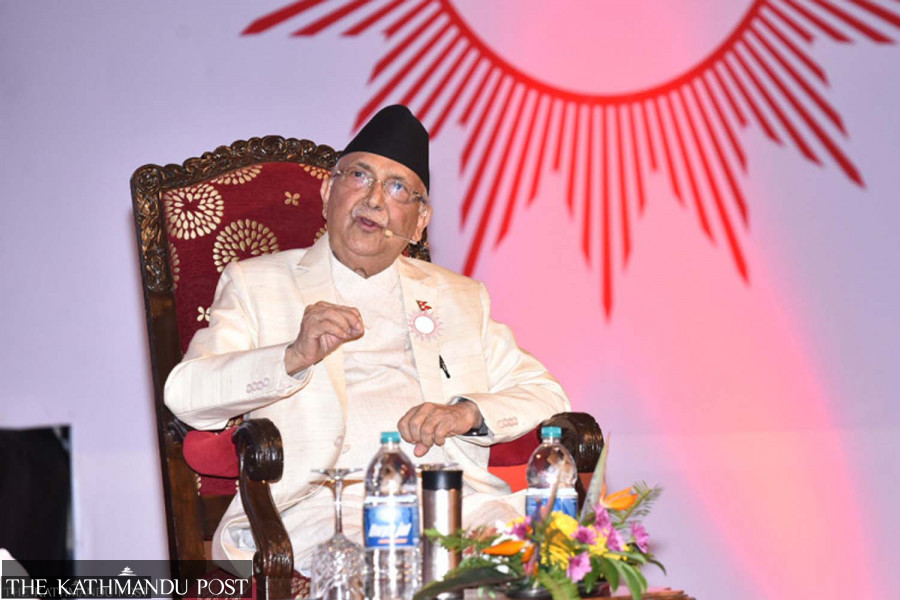Politics
Amid din of government formation, will the CPN-UML remain silent?
Party members say multiple options are open including tying up with the Maoists or the Congress for a ruling coalition.
Nishan Khatiwada
As vote counting of the November 20 elections nears its end, the debate on which party will lead—and which will join the next government—has surfaced.
And eyes are also largely on CPN-UML as it becomes the second largest force after the polls.
Following the polls, many UML leaders publicly said they need to take initiatives to form a new government under one of their leaders.
On Monday, UML vice-chair Bishnu Poudel said at a press meet in Butwal that his party would make efforts to form a new government as no party has majority seats in the House of Representatives.
“The nation cannot move forward and development works cannot gain momentum unless the UML takes the initiative,” Poudel, who won the Rupandehi-2 constituency, said. “The UML will come forward to lead the new government.”
UML leaders also claim that they will welcome cooperation with other parties to form a government. Some say they are in a wait and watch mood.
Party’s vice-chair Subash Chandara Nembang said they are yet to discuss the government formation as many leaders have not returned to Kathmandu after the election.
“Soon after their return, we will begin intra-party and inter party discussions. We are open to cooperation and discussion with other parties too in this matter,” he told the Post. “The public voted for and gave us their verdict. We will not leave any stone unturned in seeking options so as to justify the public’s wish.”
However, party leaders also say they are not in a hurry.
“As the final election results are not out yet, and as we heard in the speeches of the Congress-led alliance leaders during the elections that the alliance would continue for decades, we are in the mood to wait and watch,” said Bishnu Rijal, deputy chief of the Publicity Department of CPN-UML.
It is still uncertain whether the Congress-led alliance will garner the majority. Without a clear majority, both sides will start exploring options.
“In such a case, we will also hold discussions with other parties,” Rijal said. “But we will not knock the Nepali Congress’s door first. If there is no chance of a strong government being formed and the Congress approaches us, we will welcome it.”
After the 2017 polls, UML chair KP Sharma Oli had formed a government with support from the Maoist Centre. Later, both parties merged to form the Nepal Communist Party.
Dahal had publicly said that an agreement was reached with Oli a day before the merger stating that the co-chairs will lead the government for equal periods of time. Disputes and turmoil spread like wildfire in the party after Dahal began to bring up what was agreed.
On March 7, 2021, the Supreme Court scrapped the merger, which pushed the UML and the Maoist Centre back to their pre-merger status. Following two House dissolutions, Nepali Congress President Sher Bahadur Deuba took over the post of executive head on July 13, 2021.
Observers say though it is not easy for the UML to cobble together a coalition with a majority required to form a government, they will not remain silent watchers.
Jhalak Subedi, a political analyst, said the UML would not become a silent watcher. According to him, UML on the one hand, is watching the moves of the Congress-led alliance, and is in a mood to take advantage of the potential disenchantment in the alliance partners on the other.
As of this writing, the Nepali Congress has won 54 first-past-the-polls seats in the federal polls and is leading in one constituency. UML has locked in 44 seats so far. Similarly, the Maoist Centre is standing third with 17 seats.
Under the proportional representation category, the UML has emerged as the largest party, garnering 27.31 percent of votes, the Congress got 25.88 percent and the Maoist Centre received 11.50 percent votes.
Without the Congress, the UML needs the Maoist Centre to form a government. As such, Pushpa Kamal Dahal should be given the prime ministerial position. “But a large chunk of leaders in the UML doesn’t want Prachanda as prime minister,” Subedi told the Post.
There are also talks about Oli offering the prime ministerial position to Dahal. Nembang, the party vice-chair, however, dismissed the approach as rumours. “There is no such development,” he said.
Subedi added that the UML could also be ready to tie up with the Congress in a bid to keep the Unified Socialist and the Maoist Centre out of power. “But I don’t think Congress will easily opt for that.”




 8.79°C Kathmandu
8.79°C Kathmandu














